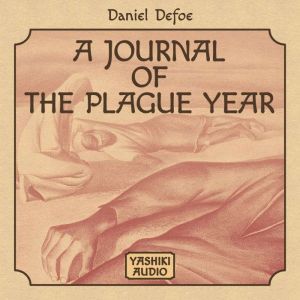

A Journal of the Plague Year
Author: Daniel Defoe
Narrator: Victor Craig
Unabridged: 8 hr 38 min
Format: Digital Audiobook Download
Publisher: Yashiki Audio
Published: 09/22/2020
Categories: Nonfiction, History, European History


Author: Daniel Defoe
Narrator: Victor Craig
Unabridged: 8 hr 38 min
Format: Digital Audiobook Download
Publisher: Yashiki Audio
Published: 09/22/2020
Categories: Nonfiction, History, European History
Daniel Defoe (1660–1731) is an English novelist, pamphleteer, and journalist, whose most famous work is Robinson Crusoe. Along with Samuel Richardson, Defoe is considered the founder of the English novel.
Defoe studied at Charles Morton's Academy in London, then delved into politics and trade, for which he traveled extensively throughout Europe. In the early 1680s, Defoe was a commission merchant in Cornhill but went bankrupt in 1691. In 1684 he married Mary Tuffley, with whom he had two sons and five daughters.
In 1702 Defoe wrote his famous pamphlet The Shortest Way With Dissenters, in which he mimicked the extreme attitudes of High Anglican Tories and pretended to argue for the extermination of all Dissenters. Defoe was arrested and pilloried for it.
When the Tories fell from power Defoe continued to carry out intelligence work for the Whig government. In his own days, Defoe was regarded as an unscrupulous, diabolical journalist.
Defoe was one of the first to write stories about believable characters in realistic situations using simple prose. He achieved literary immortality when in 1719 he published Robinson Crusoe, which was based partly on the memoirs of voyagers and castaways, such as Alexander Selkirk. During his remaining years, Defoe concentrated on books rather than pamphlets. Among his works are Moll Flanders, A Journal of the Plague Year, and Captain Jack. His last great work of fiction, Roxana, appeared in 1724. By the 1720s Defoe had ceased to be politically controversial in his writings, and he produced several historical works, a guide book, and The Great Law of Subordination Considered, an examination of the treatment of servants.
Phenomenally industrious, Defoe produced in his last years works involving the supernatural: The Political History of the Devil and An Essay on the History and Reality of Apparitions. He died on April 26, 1731, at his lodgings in Ropemaker's Alley, Moorfields.
Because writing is an expression of human character, what is true of one's character is true of one's writing as well. A person's strengths and weaknesses are often two sides of the same coin—the sympathetic character is often permissive, the assertive unreasonable, the ardent rash—and the same thin......more
In the crowded unhealthy unclean foul, pest dominated filthy city of London the Black Plague breaks out in 1665, no surprise it had occurred before in fact just a few years previously but this escalates, felling some say 100,000 people who never rise again. Daniel Defoe the inventor of the English l......more
In 1664, Borif De Pfeffel Jonffon was the Mayor of London. He was widely popular with his flowing blonde wig and extravagant ruff. Having invented the highly successful sport of peacock wiff-waff, where live cocks were thwacked across a bronze table with scimitars, then skinned and served whole to t......more
It was a very ill time to be sick in… My pandemic reading continues with this classic work about one of the worst diseases in European history: bubonic plague. Daniel Defoe wrote this account when the boundaries between fiction and non-fiction were looser. He freely mixes invention, hearsay, anec......more